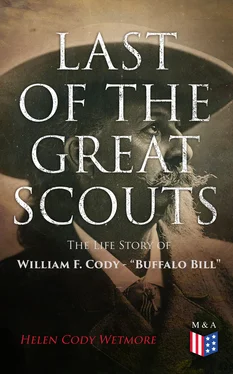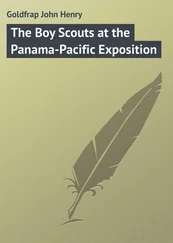Brother Will constituted himself an armed escort, and rode proudly alongside on his pony, his gun slung across the pommel of his saddle, and the dog Turk bringing up the rear.
To him this Western trip thrilled with possible Indian skirmishes and other stirring adventures, though of the real dangers that lay in our path he did not dream. For him, therefore, the first week of our travels held no great interest, for we were constantly chancing upon settlers and farm-houses, in which the night might be passed; but with every mile the settlers grew fewer and farther between; until one day Will whispered to us, in great glee: "I heard father tell mother that he expected we should have to camp to-night. Now we'll have some fun!"
Will's hope was well founded. Shortly before nightfall we reached a stream that demanded a ferry-boat for its crossing, and as the nearest dwelling was a dozen miles away, it was decided that we should camp by the stream-side. The family was first sent across the ferry, and upon the eight-year-old lad of the house father placed the responsibility of selecting the ground on which to pitch the tents.
My brother's career forcibly illustrates the fact that environment plays as large a part as heredity in shaping character. Perhaps his love for the free life of the plains is a heritage derived from some long-gone ancestor; but there can be no doubt that to the earlier experiences of which I am writing he owed his ability as a scout. The faculty for obtaining water, striking trails, and finding desirable camping-grounds in him seemed almost instinct.
The tents being pitched upon a satisfactory site, Will called to Turk, the dog, and rifle in hand, set forth in search of game for supper. He was successful beyond his fondest hopes. He had looked only for small game, but scarcely had he put the camp behind him when Turk gave a signaling yelp, and out of the bushes bounded a magnificent deer. Nearly every hunter will confess to "buck fever" at sight of his first deer, so it is not strange that a boy of Will's age should have stood immovable, staring dazedly at the graceful animal until it vanished from sight. Turk gave chase, but soon trotted back, and barked reproachfully at his young master. But Will presently had an opportunity to recover Turk's good opinion, for the dog, after darting away, with another signaling yelp fetched another fine stag within gun range. This time the young hunter, mastering his nerves, took aim with steady hand, and brought down his first deer.
On the following Sabbath we were encamped by another deep, swift-running stream. After being wearied and overheated by a rabbit chase, Turk attempted to swim across this little river, but was chilled, and would have perished had not Will rushed to the rescue. The ferryman saw the boy struggling with the dog in the water, and started after him with his boat. But Will reached the bank without assistance.
"I've hearn of dogs saving children, but this is the first time I ever hearn of a child saving a dog from drowning," ejaculated the ferryman. "How old be you?"
"Eight, going on nine," answered Will.
"You're a big boy for your age," said the man. "But it's a wonder you didn't sink with that load; he's a big old fellow," referring to Turk, who, standing on three feet, was vigorously shaking the water from his coat. Will at once knelt down beside him, and taking the uplifted foot in his hands, remarked: "He must have sprained one of his legs when he fell over that log; he doesn't whine like your common curs when they get hurt."
"He's blooded stock, then," said the man. "What kind of dog do you call him?"
"He's an Ulm dog," said Will.
"I never heard tell of that kind of dog before."
"Did you ever hear of a tiger-mastiff, German mastiff, boar-hound, great Dane? Turk's all of them together."
"Well," said the ferryman, "you're a pretty smart little fellow, and got lots of grit. You ought to make your mark in the world. But right now you had better get into some dry clothes." And on the invitation of the ferryman, Will and the limping dog got into the boat, and were taken back to camp.
Turk played so conspicuous and important a part in our early lives that he deserves a brief description. He was a large and powerful animal of the breed of dogs anciently used in Germany in hunting the wild boars. Later the dogs were imported into England, where they were particularly valued by people desiring a strong, brave watch-dog. When specially trained, they are more fierce and active than the English mastiff. Naturally they are not as fond of the water as the spaniel, the stag-hound, or the Newfoundland, though they are the king of dogs on land. Not alone Will, but the rest of the family, regarded Turk as the best of his kind, and he well deserved the veneration he inspired. His fidelity and almost human intelligence were time and again the means of saving life and property; ever faithful, loyal, and ready to lay down his life, if need be, in our service.
Outlaws and desperadoes were always to be met with on Western trails in those rugged days, and more than once Turk's constant vigilance warned father in time to prevent attacks from suspicious night prowlers. The attachment which had grown up between Turk and his young master was but the natural love of boys for their dogs intensified. Will at that time estimated dogs as in later years he did men, the qualities which he found to admire in Turk being vigilance, strength, courage, and constancy. With men, as with dogs, he is not lavishly demonstrative; rarely pats them on the back. But deeds of merit do not escape his notice or want his appreciation. The patience, unselfishness, and true nobility observed in this faithful canine friend of his boyhood days have many times proved to be lacking in creatures endowed with a soul; yet he has never lost faith in mankind, or in the ultimate destiny of his race. This I conceive to be a characteristic of all great men.
This trip was memorable for all of us, perhaps especially so for brother Will, for it comprehended not only his first deer, but his first negro.
As we drew near the Missouri line we came upon a comfortable farm-house, at which father made inquiry concerning a lodging for the night. A widow lived there, and the information that father was brother to Elijah Cody, of Platte County, Missouri, won us a cordial welcome and the hospitality of her home.
We were yet in the road, waiting father's report, when our startled vision and childish imagination took in a seeming apparition, which glided from the bushes by the wayside.
It proved a full-blooded African, with thick lips, woolly hair, enormous feet, and scant attire. To all except mother this was a new revelation of humanity, and we stared in wild-eyed wonder; even Turk was surprised into silence. At this point father rejoined us, to share in mother's amusement, and to break the spell for us by pleasantly addressing the negro, who returned a respectful answer, accompanied by an ample grin. He was a slave on the widow's plantation.
Reassured by the grin, Will offered his hand, and tasted the joy of being addressed as "Massa" in the talk that followed. It was with difficulty that we prevailed upon "Masse" to come to supper.
After a refreshing night's sleep we went on our way, and in a few days reached my uncle's home. A rest was welcome, as the journey had been long and toilsome, despite the fact that it had been enlivened by many interesting incidents, and was thoroughly enjoyed by all of the family.
CHAPTER II. — WILL'S FIRST INDIAN.
Table of Contents
MY uncle's home was in Weston, Platte County, Missouri, at that time the large city of the West. As father desired to get settled again as soon as possible, he left us at Weston, and crossed the Missouri River on a prospecting tour, accompanied by Will and a guide. More than one day went by in the quest for a desirable location, and one morning Will, wearied in the reconnoissance, was left asleep at the night's camping-place, while father and the guide rode away for the day's exploring.
Читать дальше












